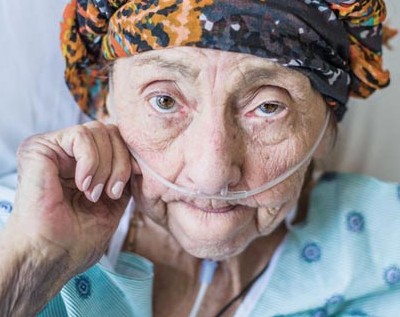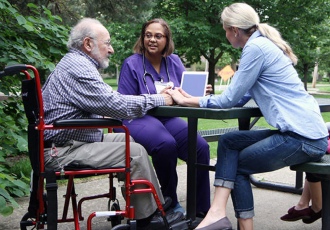By Eric Shaban, MD, Regional Medical Director, VITAS Healthcare
Providing care for people with Alzheimer's or other forms of dementia can take a significant toll on the caregiver. Caregivers of people with dementia endure substantial emotional, financial, and physical difficulties twice as often as caregivers of people without dementia1.
Studies show that when patients receive hospice services, not only are their distinct needs more thoroughly met, but caregiver burden is also significantly reduced.
Improved Symptom Burden
Older people with advanced dementia become dependent on others for their personal care and daily function. Common complications of advanced dementia are eating and swallowing problems (86%), fever (53%), and pneumonia (41%)2.
With the introduction of hospice or palliative care into patients’ care plans, there was a 12% reduction in symptom burden, according to a 2019 study by Sternberg et al. There were also significant results regarding the reduction and prevention of hospitalizations and a reduction in unnecessary medication use for these patients as well.
Decreased Caregiver Burden
Sternberg et al. also showed that through incorporating hospice services, there was an 88% improvement in caregiver burden. Great peace of mind comes with knowing a loved one is receiving the right care for their specific needs during a time when they need it most.
When healthcare professionals discuss these options sooner, caregivers can better understand that they have potentially better alternatives than taking on the burden of caring for a loved one by themselves.
Increased Satisfaction with Care
Ultimately, one of the most important factors for patients and their families is their satisfaction with the care they are receiving. Patients and families should ask themselves: Are caregivers confident their loved one is comfortable? Are caregivers having to set aside their own responsibilities to provide care? These are valid, important questions.
Throughout the 2019 study, caregivers reported, “that they felt more comfortable caring for their loved one at home, suffering had been decreased, and that they learned more about the trajectory of dementia” when provided access to hospice or palliative care. A 2008 study2 by Shega et al. supported the idea of caring for patients at home; it found that hospice enrollees are significantly more likely to die in their location of choice, which was most often at home rather than in the hospital. Enrolling in hospice reduces hospitalization by 40%-50%. Hospice enrollees also experience fewer care transitions and overall better health.
Download: Hospice Eligibility Guidelines for Alzheimer’s and Dementia
Caregiver satisfaction with care is also higher with hospice enrollment: Shega et al. report that a higher proportion of caregivers of hospice enrollees rated patient care as excellent or very good than did caregivers of non-enrollees. Caregivers of enrollees also reported higher mean ratings of satisfaction with care.
Access to information is essential for patients and families to best understand the benefits of hospice, including those coping with advanced dementia. VITAS Healthcare works in conjunction with attending physicians to ensure communication between families, patients, and healthcare professionals is clear and easily accessible.
Clear communication begins with transparency about the importance of hospice care for patients reaching end of life, especially with the specific needs of those facing advanced dementia. Start the conversation with your eligible patients and refer today.
1Sternberg, S. A., et al. (2019). Home hospice for older people with advanced dementia: A pilot project. Israel Journal of Health Policy Research, 8(1)
2Shega, J. W., et al. (2008). Patients Dying with Dementia- Experience at the End of Life and Impact of Hospice Care. Journal of Pain and Symptom Management


